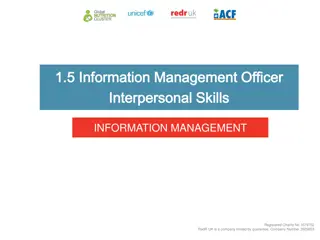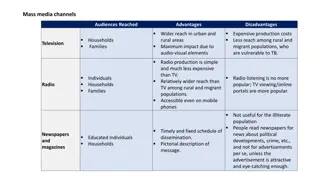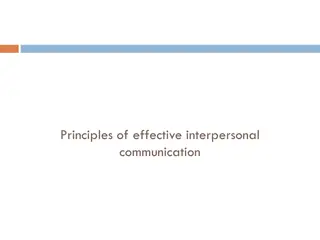Interpersonal Process
Explore the significance of interpersonal communication in addressing physical, social, and practical needs, the impact of technology and cultural diversity, and the importance of communication competence.
0 views • 27 slides
Enhancing Interpersonal Communication Skills
Explore the dynamics of interpersonal communication in this chapter, covering topics such as social penetration theory, self-disclosure principles, intrapersonal communication, and self-concept understanding. Learn how to improve communication effectiveness and relationships through active listening
0 views • 13 slides
Understanding Dialectical Behavior Therapy (DBT) Skills and Practices
Explore the foundations of Dialectical Behavior Therapy (DBT) as a treatment for various dysregulation behaviors. Learn about the history, skills, and outcomes associated with DBT, including mindfulness practices and emotional regulation techniques. Discover how DBT combines cognitive behavioral the
5 views • 96 slides
Interpersonal factors and their impact on pain transitions
Exploring the impact of interpersonal factors on pain transitions, this research delves into the communication and behaviors between individuals experiencing pain, such as parent-child relationships and interactions with healthcare providers. The study analyzes psychosocial mechanisms influencing pa
3 views • 24 slides
Developing Effective People Skills in Collaborative Work Environments
In Eng101 New Language Leader Level 1, students explore the significance of peer collaboration and group work, learn about different types of TV programs, and practice writing reviews. The lesson emphasizes the value of working with others, highlighting skills such as effective communication, listen
1 views • 18 slides
Embracing Cultural Intelligence: Moving Beyond Stereotypes
Explore the complexities of culture, interpersonal dynamics, and cultural intelligence through the lens of individuals like Paul N.Wolfskill. Discover how culture influences behaviors and perceptions, and how developing cultural intelligence can bridge gaps and foster understanding.
1 views • 16 slides
Effective Strategies for Managing Interpersonal Conflict at Work
In this seminar led by experts in organizational psychology, attendees learn practical approaches to reduce interpersonal conflict fallout in the workplace. Discussions range from understanding individual and organizational factors influencing conflict to exploring remedies for resolving conflict es
1 views • 21 slides
Understanding Professionalism in the Workplace
Professionalism in the workplace involves conforming to specific rules governing appropriate behavior at work. This includes adherence to job-specific policies, environmental rules for creating a positive work environment, and personal conduct guidelines. Possessing qualities like interpersonal skil
1 views • 26 slides
Effective Communication: Understanding Styles and Advantages
Communication encompasses various styles including verbal, non-verbal, visual, and written forms. Each style plays a crucial role in conveying information efficiently. Written communication offers advantages like creating a permanent record, meticulous presentation, easy circulation, and suitability
10 views • 21 slides
Understanding Career Guidance Strategies
Career guidance strategies involve assessing individual potential, values, environmental influences, and decision-making skills. Counseling techniques, interpersonal relationships, and instructional methods play key roles in guiding individuals towards their career paths. By recognizing one's streng
10 views • 17 slides
The Main Factors That Influence the Consumer Buyer Behavior
Consumer buyer behavior is influenced by various factors such as cultural, social, personal, and psychological elements. Culture, social factors like family and opinion leaders, personal factors such as age, occupation, lifestyle, and personality, as well as psychological factors like motivation, pl
2 views • 8 slides
Understanding Theme and Function in Language
Explore the concepts of theme and function in language including topical, interpersonal, and textual themes. Learn how themes come first in a clause and can be assigned transitivity functions, moods, and more. See examples and visual representations to enhance your understanding.
5 views • 13 slides
Effective Communication Using DEAR MAN Skills in Interpersonal Relationships
DEAR MAN is a mnemonic device that helps in utilizing assertiveness and interpersonal skills in personal situations. It involves steps like Describe, Express, Assert, Reinforce, BE Mindful, Appear Confident, and Negotiate. By following these steps, individuals can effectively communicate their needs
8 views • 11 slides
Mastering Interpersonal Communication Skills for Success in the Workplace
Interpersonal communication involves the exchange of information, ideas, and feelings through verbal and non-verbal methods. Developing strong skills in encoding, decoding, feedback, and utilizing different communication mediums is crucial for effective communication. Good interpersonal skills enhan
0 views • 9 slides
Understanding Interpersonal and Intrapersonal Conflicts in Business Administration
Exploring the differences between interpersonal and intrapersonal conflicts, this presentation delves into the meaning of conflicts, their occurrence, key topics, and resolution strategies. It highlights conflict scenarios in various settings and emphasizes the importance of effective communication
2 views • 11 slides
Analysis of Individual Risk Factors in Ventral Hernia Repair Outcomes
This study explores the impact of various risk factors on predicting adverse outcomes of ventral hernia repair using data from the Abdominal Core Health Quality Collaborative (ACHQC). The research aims to quantify and compare the influence of different factors, hypothesizing that hernia- and procedu
0 views • 14 slides
Improving Interpersonal Skills for Effective Information Management
Enhancing interpersonal skills is crucial for Information Management Officers (IMOs) to work effectively with diverse stakeholders. This includes understanding various perspectives, tailoring communication, listening actively, and leading stakeholders. Challenges like inter-personal issues can imped
0 views • 29 slides
Therapeutic Factors in Group Therapy: Enhancing Interpersonal Relationships
Explore the therapeutic factors in group therapy that focus on enhancing interpersonal relationships, instilling hope, promoting universality, and fostering group cohesiveness. Through interactions with fellow group members, clients can improve their interpersonal skills and generalize lessons learn
0 views • 29 slides
Understanding Environmental Factors in Terrestrial and Aquatic Environments
Environmental factors play a crucial role in shaping ecosystems. In both terrestrial (land) and aquatic (water) environments, organisms are influenced by abiotic factors such as temperature, light intensity, and pH, as well as biotic factors like plants, predators, and competitors. Understanding the
5 views • 19 slides
Factors Affecting Microbial Growth in Food: Intrinsic and Extrinsic Factors
In food, microbial growth is influenced by intrinsic factors like pH, water activity, nutrient content, and extrinsic factors such as environmental conditions. The pH level, moisture content, and water activity play crucial roles in determining the growth of microorganisms, with specific ranges affe
1 views • 23 slides
Factors Influencing Customer Choice: Psychological, Sociocultural, Economic, and Government Factors
Psychological factors, such as perception and lifestyle, play a key role in customer choice. Sociocultural influences from society and culture also impact decisions, while economic factors like income levels and government policies can sway customer preferences. Understanding these factors is crucia
0 views • 18 slides
Comprehensive Guide to Factorization in Mathematics
Explore the concept of factorization in algebraic expressions, including the definition of factors, common factors, methods of factorization, and illustrated examples. Learn about finding factors, common factors, and various factorization techniques such as common factors method and regrouping of te
0 views • 13 slides
Mental Health, Substance Use, and Interpersonal Violence in Baltimore EMA Agencies
Explore the use of screening tools in Baltimore EMA agencies to ensure appropriate processes for addressing mental health, substance use, and interpersonal violence. Emphasis on reliability, validity, and data collection methods through a survey conducted across various agencies in the area.
0 views • 19 slides
Understanding Binge Eating in Children and Adolescents: Implications for Obesity Practitioners
Conceptualizing binge eating in young individuals involves criteria like loss of control over eating and the amount of food consumed. The prevalence of binge eating varies based on definitions and assessment methods, with non-treatment seekers showing lower rates than treatment seekers. The developm
0 views • 5 slides
Sociocultural and Interpersonal Influences on Consumer Behavior
Explore how cultures, social identities, friends, family, and reference groups affect consumer behavior. Learn about the impact of interpersonal relationships on product sharing and brand experiences. Understand the significance of cultural influences, reference groups, and how they shape consumer d
0 views • 6 slides
Understanding Values, Perceptions, and Attributions in Conflict Management
Values, perceptions, and attributions play key roles in conflict management. Values shape behaviors, perceptions guide how we interpret information, and attributions help us understand causes of events. This chapter explores how these factors influence interpersonal interactions and offers strategie
0 views • 16 slides
Effective Communication Strategies for Health Promotion
This comprehensive guide explores various mass media channels, mid-media outdoor publicity materials, and interpersonal communication strategies for reaching different audiences with health messages. It discusses the advantages and disadvantages of each method, including their reach, cost implicatio
0 views • 6 slides
Ecological Factors and Climatic Influences on Plant Life
Ecological factors play a crucial role in shaping the environment for organisms to thrive. This includes living (biotic) and non-living (abiotic) components like climatic factors, edaphic factors, topographic factors, and biotic factors. Climatic factors such as light, temperature, water, wind, and
0 views • 14 slides
Understanding Interpersonal Needs and Conflict Resolution in Personal Growth
Explore the importance of interpersonal needs such as inclusion, control, and affection in personal growth along with conflict resolution strategies like problem-solving, emotional intelligence, and communication skills. Discover insights on FIRO-B theory and practical skills for managing conflicts
0 views • 10 slides
Significance of Psychological Theories in Understanding Suicidal Behavior
Psychological theories play a crucial role in guiding research, clinical work, and the development of new hypotheses related to suicidal behavior. The Interpersonal-Psychological Theory of Suicidal Behavior emphasizes social forces, such as disturbed regulation of individuals by society, social inte
0 views • 14 slides
Understanding Factors and Prime Factors in Mathematics
Explore the concept of factors and prime factors through practical scenarios involving Jedward, stationary supplies, and school choirs. Learn how to find factors of numbers like 18 and 30, identify prime numbers, write numbers as products of prime factors, determine common factors, and calculate low
0 views • 19 slides
Understanding Mesopic Factors in Roadway Calculations
Exploring the incorporation of mesopic factors into roadway calculations and how different design luminance ranges and Scotopic/Photopic (S/P) ratios interact with various calculation methods. The discussion includes factors as defined in TM-12 and proposed for RP-8, along with IES RP-8's Mesopic Fa
0 views • 37 slides
Managerial Roles and Skills in Information Technology (IT)
Information Technology (IT) is increasingly utilized by managers to gain a comprehensive view of their organization. Managers perform various roles categorized as Interpersonal, Informational, and Decisional according to Mintzberg. Decisional roles involve strategic planning, resource management, an
0 views • 4 slides
Analysis of Data Collection Practices for Interpersonal Violence Services in Peel
The Peel Institute on Violence Prevention conducted a pilot study in May 2015 to identify gaps in data collection practices of health, justice, and social service agencies serving survivors of interpersonal violence in the Peel region. The study aimed to understand service availability, standardize
0 views • 38 slides
Factors Influencing Gestation Length in Various Animals
This comprehensive guide explores the factors affecting gestation length in different animals, including cattle, mares, sheep, goats, camels, buffaloes, dogs, and cats. It covers factors that prolong gestation, such as genetic factors, deficiencies in minerals and vitamins, anomalies in the fetus, a
0 views • 18 slides
Mastering Effective Interpersonal Communication: Key Principles and Strategies
Effective interpersonal communication is essential for human existence, impacting our happiness and relationships. This entails clear encoding, minimal noise, and strategic message delivery. Communicators must possess expertise, charisma, and sincerity. Messages should appeal to logic and evoke emot
0 views • 20 slides
Cross-National & Cross-Cultural Risk Factors for Offending
Explore key risk factors for offending across nations & cultures, analyzing homicide rates, structural differences, individual/family factors, and the generalizability of crime risk factors. Learn about findings related to impulsivity, achievement, conduct problems, family supervision, parenting sty
0 views • 13 slides
Factors Influencing Voting Behavior: A Comprehensive Analysis
This essay evaluates various factors influencing voting behavior, including media, social class, age, gender, geography, ethnicity, party leader image, issues, rational choice, party affiliation, tactical voting, dealignment, third-party choices, and non-voting. It discusses the relative importance
0 views • 12 slides
Developing Emotional Intelligence and Interpersonal Skills in Palliative Care
Enhance emotional intelligence skills in healthcare for improved collaboration and patient outcomes. Focus on building interpersonal relationships through the B.O.N.D.S approach, valuing voices of patients and family members, and fostering effective communication. By practicing empathy, active liste
0 views • 8 slides
Insights on Interpersonal Attraction, Relationships, and Love
Discover the significance of relationships in life, explore factors influencing interpersonal attraction like proximity, similarity, and physical appearance. Delve into stereotypes related to attractiveness, learn about Sternberg's Triangular Theory of Love, different types of love such as Companion
0 views • 29 slides







































